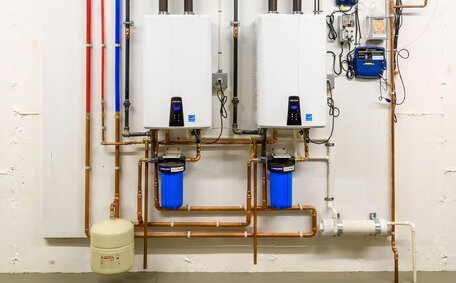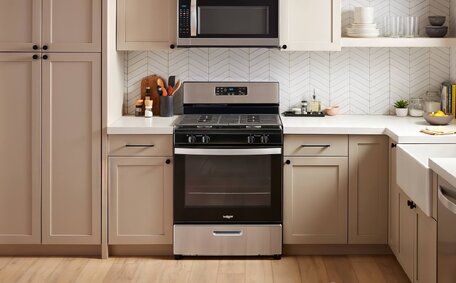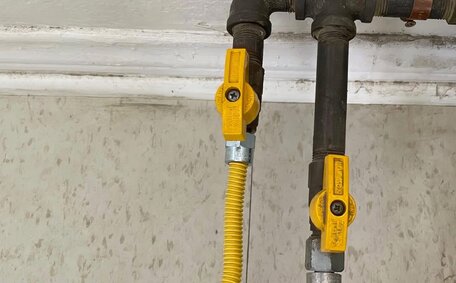
How Hard Water Hurts Hot Water Heaters
Hard water leaves mineral deposits in heaters, pipes and tanks. This limescale reduces efficiency, lifespan and hot water availability. Contact us for affordable water softening solutions.
Read MoreSelecting the right gas hot water system demands an evaluation of your household’s specific needs. Daily hot water consumption can fluctuate widely depending on how many people live in your home:
By estimating daily usage and peak demand for hot water, you’ll ascertain the suitable size for your water system, preventing shortage issues at peak times. It’s sensible to pick a hot water system best aligned to your requirements if youre unsure about your household’s consumption pattern.
Usage also tends to increase in the winter; indeed, families often seek the best hot water system to meet their showers and washing routines.
It’s a good idea to consider future needs as well - like if your family is planning to expand in the near future. The goal is to select a hot water system your home can rely on for satisfying service for the years ahead.
Several key elements should be considered when selecting a new water heater:
Consulting with water heating specialists, such as Picnic Point Plumbing, can help you evaluate options and find a hot water system that precisely meets your needs.
Understanding the various hot water systems, including the advantages of heat pump systems with storage tanks versus continuous flow, is essential for making an informed choice. Understanding the subtleties between hot water heaters like gas storage hot water systems and others can guide you to the best option for your household.
Gas storage water systems efficiently heat and store water in insulated tanks, ready for immediate use, offering true energy-saving benefits. They are better suited to households that need a lot of hot water tank storage capacity and have more variable demand times.
Continuous flow units, as opposed to storage hot water systems, instantly warm water as needed, eliminating the requirement for a large storage tank. They suit low to medium usage households with more consistent demand.
*Upsize continuous flow water systems if concerned about capacity
When considering your options, take into account your household’s size, types water heaters usage patterns and any layout constraints. The team at Picnic Point Plumbing can offer guidance tailored to finding the right type of system to meet your hot water needs.
The energy efficiency star rating is a crucial factor when choosing a gas hot water system, as it measures an appliance’s effectiveness in heating water on a 1 to 10 scale.
Opting for a system best in energy efficiency with a higher star rating typically helps you save money through greater long-term savings on your energy bills. While systems that are more energy efficient might carry a higher price tag at the outset, the investment can be balanced out by the savings on your energy bill over time.
As a general guide, here are the star ratings to look for with gas hot water systems:
For instance, 8 star rated electric hot water systems could have higher upfront costs but deliver efficient operation. Over a period of 5-10 years, the savings on your energy bills can really add up.
Higher rated systems also excel as efficient hot water savers, cutting down on energy use and greenhouse gas emissions. So opting for greater efficiency aligns with environmental benefits as well.
Engage in a discussion about how to use hot water efficiently, particularly for solar hot water and solar water heating systems, with our team at Picnic Point Plumbing. We can dispense tailored advice considering your household’s usage, budget, and priorities to aid in selecting the efficient gas system to keep your water heated optimally.
Having your gas hot water system professionally installed and regularly serviced is critical for safety, performance and longevity.
Hot water heater installations, especially for gas models, must always be handled by licenced professionals. Our qualified plumbers at Picnic Point Plumbing follow all manufacturer instructions and Australian Standards for correct fitting and operation.
Key aspects of installation, such as accommodating a solar heat pump, include:
We manage all council approvals and certification, ensuring adherence to regulations for best gas hot water generation installations.
Regular maintenance from our service team will keep the hot water heater supplying water your home relies on performing optimally for an extended period while also curbing operating costs.
Standard servicing tasks, which aren’t expensive to run, include:
We recommend scheduling an annual service for optimal efficiency and reliability. Please call our friendly team at Picnic Point Plumbing to arrange professional gas hot water installation or servicing.
When it comes to fuel sources for gas hot water systems, two of the main options are LPG (liquefied petroleum gas) and natural gas. Understanding the differences can help you determine the most suitable type for your home.
The first consideration is availability of gas supply:
Here in the Picnic Point region, natural gas is readily available due to extensive existing supply infrastructure. This makes it the more convenient fuel choice for most households.
In terms of running costs:
Always check updated tariffs for each fuel type with your energy provider when evaluating the operating expenses.
Key aspects for installation include:
Our team of qualified plumbers handle all aspects of installation for every type of gas hot water system. We stay up-to-date on all regulations to ensure your new system meets Australian Standards.
For specific guidance on selecting gas solar water heating solutions for your abode, reach out to the friendly team at Picnic Point Plumbing today.
When evaluating continuous flow hot water systems, an important aspect is the comparison of estimated operating costs. Factors influencing your new water system expenses include:
As an example, how much does a typical Australian household spend on electric gas hot water systems? Approximately $250 - $350 per annum to run a well-sized, premium 5-6 star gas electric hot water system.
Upgrading to an 8 star rated instantaneous gas unit may cost an additional $500, but the potential to save about $100 per year on energy bills, due to advanced technology and the elimination of standby heat losses, can make it worthwhile. This means potential savings of over $1000 systems can achieve across the lifespan.
The team at Picnic Point Plumbing can provide advice tailored to your household on calculating the estimated yearly energy costs for different gas hot water systems. Contact us today to evaluate the options and determine which is the most cost-effective choice.
Hard water leaves mineral deposits in heaters, pipes and tanks. This limescale reduces efficiency, lifespan and hot water availability. Contact us for affordable water softening solutions.
Read MoreIt’s important to routinely check your gas appliances for any issues. Signs of problems include gas leaks, strange sounds, odd smells and more. Have a professional inspect your gas appliances annually and service them regularly for safety.
Read MoreUpgrading your gas meter is a simple process completed by registered technicians. It involves disconnecting your gas supply for 15 minutes to swap the old meter for a new digital smart meter. The upgrade is free and improves accuracy.
Read MorePicnic Point, 2213 NSW
We will call back as soon as possible.




